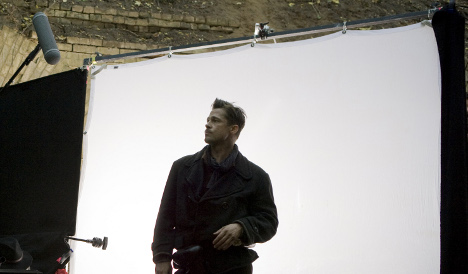It survived the Nazis and the communists and is now capitalising on its legendary status among cinema history buffs like Quentin Tarantino to beat back tough competition from the likes of London, Prague and Budapest.
Marlene Dietrich smouldered on its sound stages, science-fiction trailblazer “Metropolis” took off from Babelsberg in 1926 and Alfred Hitchcock learned the ropes here as a fresh-faced assistant director.
“All the Hollywood people say ‘What a history, it’s an honour to work here’, whether it’s Tom Hanks or Tarantino, who of course knew every film that was ever made here,” Eike Wolf, Babelsberg’s head of publicity, said on a tour of the sprawling site ahead of the centennial jubilee on February 12.
Hanks just wrapped up filming “Cloud Atlas”, which, with a budget of around $100 million (€76 million), its producers have called the most expensive German-produced film of all time.
Tarantino, for his part, lovingly constructed a replica of an old-time Paris cinema here only to blow it to smithereens at the end of “Inglourious Basterds”, with Hitler inside.
And Clive Owen made Swiss cheese of a nearly life-size replica of New York’s Guggenheim Museum that was built here, in a shoot-out in “The International.”
“Berlin is very attractive for creative types – it’s a great location and it is much more affordable than London, for example,” studio chief executive Charlie Woebcken said.
A string of all-star parties, exhibitions and books are planned for the anniversary of the day in 1912 when work began on “Totentanz” (The Dance of the Dead), starring Danish superstar of the era Asta Nielsen.
The Berlin film festival running from February 9-19 will show a retrospective of Babelsberg’s greatest hits, with events also planned in Cannes, Los Angeles, New York and London.
On a walk across the lot, a visitor can struggle to picture Dietrich as just another blonde in the crowd of young actresses who turned out for the casting call of “The Blue Angel” which would rocket her to immortality.
“In today’s Marlene Dietrich Studio, there are corridors with wooden floors that Marlene actually walked on,” Woebcken said. “We left them as-is to maintain that historical flair.”
The golden age promptly ended as Nazi propaganda chief Joseph Goebbels took the reins under the Third Reich.
Babelsberg became a movie factory, churning out light entertainment and vile anti-Semitic propaganda such as the notorious “Jud Süss”.
Need a Nazi stormtrooper uniform?
After the war, the communists also recognised the power of cinema to influence the masses, and the then-DEFA Studios were dubbed “Honnywood” for longtime East German leader Erich Honecker.
“We are of course always being confronted with our history because film is the medium that you can best use to come to terms with the past and this is always a major issue in Germany,” Woebcken said.
After the Berlin Wall fell, Babelsberg went through another few incarnations before mounting a spectacular comeback in 2004 under Woebcken and his partner Christoph Fisser.
Babelsberg’s facilities stretch across 25,000 square metres (270,000 square feet). More than 3,000 films have been made here, in recent years thanks in part to German state subsidies.
The costume department, whose Lisy Christl was just nominated for an Oscar for her work on Roland Emmerich’s Shakespeare drama “Anonymous”, is a vast treasure trove of period get-up.
Row upon row of replica Nazi stormtrooper uniforms, suits of armour, glittering evening gowns, hoop skirts and neckties clustered by decade and colour await the next production.
“About half the bigger films made here are linked to German history so that makes Berlin a natural place to make them, whether it’s ‘The Reader’, ‘Inglourious Basterds’ or ‘The Pianist’,” Woebcken said.
A remarkably authentic-looking Mark Rothko painting hangs in his office courtesy of the art department, where virtually any work can be forged for use in a film.
Robert Krueger, chief set painter who has worked at Babelsberg since 1986, showed off vintage-looking Persian ceramic tiles that he made for Iranian-born director Marjane Satrapi on her latest feature, “Chicken with Plums”.
“That’s the kind of thing we discuss here – Marjane was making a very quiet, tender film with gorgeous decorations that should add to the mood,” he said. “That doesn’t work if it looks like a theatre or television set.”
Woebcken said that if Babelsberg maintains its reputation for craftsmanship along with its venerable history, it could keep going for decades to come.
“I just hope we’ll be spared the upheaval of the last 100 years during the next century,” he said.
AFP/mry



 Please whitelist us to continue reading.
Please whitelist us to continue reading.
Member comments